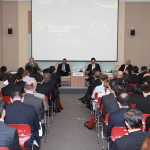-
Strategic innovation and technological progress are key in changing the energy game
-
Exploiting lesser-known conventional and unconventional energy deposits will involve risk
-
Methane hydrate, deep water and arctic drilling, oil shale, and shale gas have potential
A panel discussion, entitled “New frontiers: What is the next game changer?,” highlighted the opportunities afforded by enhanced computing and sub-surface imaging capabilities, and stressed the importance of long-term investment, strategic collaboration, and the tailored application of lessons learned in other countries to specific regional geologies and environments.
Special attention was given to several specific technologies: deep water and arctic oil and gas exploration, shale gas, oil shale, and methane hydrate development.
Osamu Watanabe, President & CEO of Japan's JAPEX energy corporation, is pinning his hopes on a decades-long project to extract methane hydrate, sometimes called “fiery ice,” from the deep ocean. Watanabe said if the project is successful in extracting and utilizing methane hydrate deposits in and around Japan's Eastern Nankai trough, the country can meet its energy demands for a hundred years. “It is our dream,” he said.
Adil Toubia, CEO of the Oil and Gas Division of Germany's Siemens corporation, stressed the indispensability of technology in reaching energy resources in the Arctic and along the deep sea bed, areas he described as “risky and harsh.” Toubia also urged the world to learn lessons from the U.S. shale gas revolution. “You cannot do it the way the US has done it,” he said, “You have to make plans, for example, for disposing of the fracking water. We can take lessons learned and apply them.”
Toubia says Siemens is looking closely at Poland, China, and Saudi Arabia, and said the safe use of sea water for fracking, along with the potential advent of waterless fracking, would mark real evolutions in the shale gas industry.
Sandor Liive, CEO and Chairman of Estonia's Eesti Energia, described a global renaissance of a resource his country has been exploiting for nearly 100 years: oil shale. Not to be confused with shale gas, oil shale is sedimentary rock that is heated to the point it exudes oil. “There is up to four times more oil locked in oil shale globally than is proven to exist in conventional oil stores today,” said Liive. He says what Estonia once used for lack of other resources has become a viable alternative in an increasingly tight energy economy. He described oil shale and Canadian oil sands as the two biggest revolutions of the last ten years, pointing out they both use available technology and have completely predictable environmental impact.
Emilio Lozoya Austin, Director General of Pemex, spoke with strong optimism regarding political and economic reforms pending since a new Mexican government was elected in December of last year. “We expect to have record-level FDI this year,” he said. Lozoya Austin said reforms and capital will help improve production in conventional oil fields as well as deep water and shale explorations, noting the disparity between U.S. and Mexican outputs despite shared geology. “We have a lot of low-hanging fruit... we look for a combination of the right technology and the right human capital, along with long term investment in Mexico-- people who are committed to the long term in the region.”
This news story is based on the session Game Changer, "New frontiers: What is the next game changer?", at the 2013 World Energy Congress.






